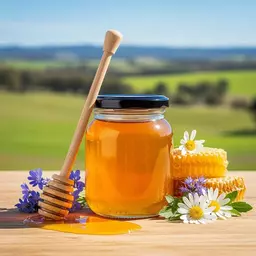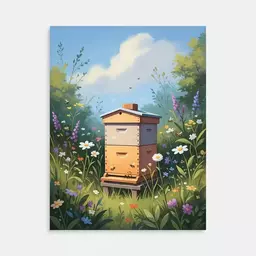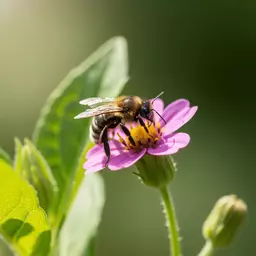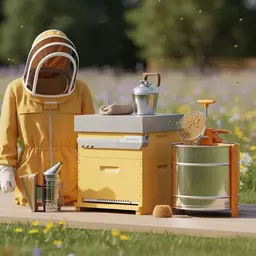Sustainable Honey: Support Ethical Beekeepers
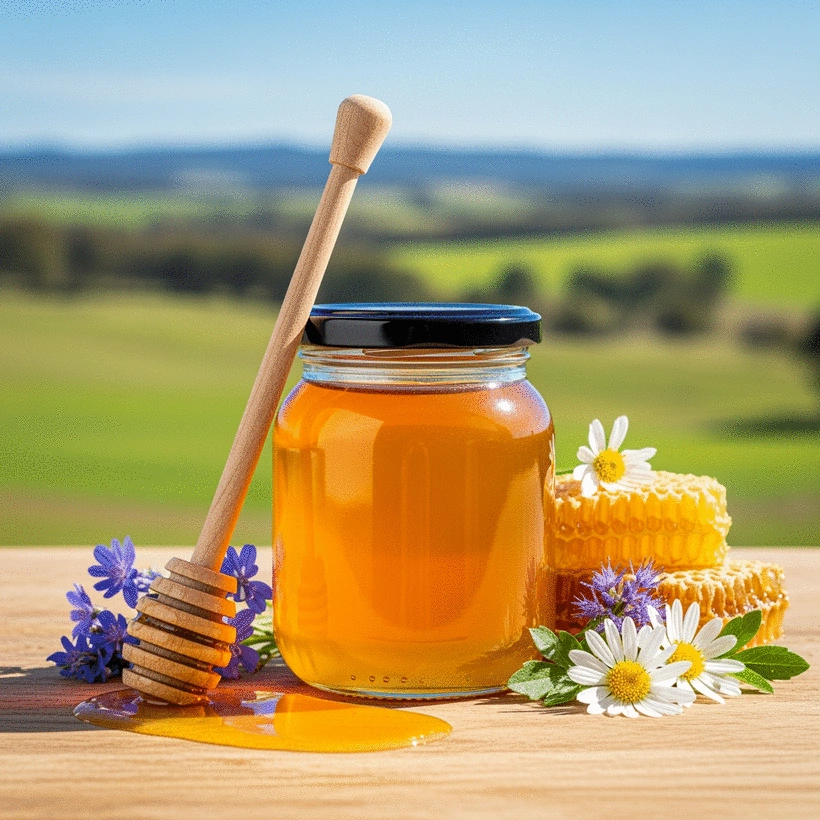
Supporting ethical beekeepers is not just about enjoying honey; it's about safeguarding our environment and the food supply for future generations. By understanding sustainable honey and ethical beekeeping practices, you can play a crucial role in protecting our planet's vital pollinators.
What You Will Learn
- Sustainable honey production prioritizes bee health and biodiversity by avoiding harmful pesticides.
- Ethical beekeeping practices include minimizing hive stress and ensuring bees have enough food to thrive.
- Supporting local beekeepers boosts community economies and promotes environmentally friendly practices.
- Understanding the critical role of bees in pollination helps appreciate their importance in our ecosystems.
- Engaging in community workshops and volunteering can enhance your knowledge and commitment to bee conservation.
- Advocacy for sustainable practices is essential for preserving bee habitats and promoting awareness.
The Pillars of Sustainable & Ethical Beekeeping
This visual highlights the key practices that define sustainable and ethical beekeeping, ensuring bee welfare and ecosystem health. For those just starting their journey, a beginner's guide to honey bees can provide a solid foundation.
Sustainable Honey Practices
Prioritizes bee health and habitat, avoiding harm to bees or environment.
- • Organic Practices
- • Bee Welfare
- • Local Sourcing
Ethical Beekeeping Principles
Embodies practices prioritizing welfare and natural behaviors of bees.
- • Limit Hive Stress
- • Avoid Over-harvesting
- • Monitor Hive Health
Why Support Ethical Beekeepers?
Bees are crucial pollinators for ecosystems and food supply globally.
- • Pollinate 75%+ Flowering Plants
- • Support Fruits, Veggies, Nuts
- • Enhance Biodiversity
Supporting Ethical Beekeepers
Actions extend beyond purchases; actively support and promote practices.
- • Join Beekeeping Clubs
- • Attend Workshops
- • Volunteer for Conservation
Understanding Sustainable Honey and Ethical Beekeeping in Australia
As I dive into the intricate world of sustainable honey and ethical beekeeping, I can't help but feel a deep connection to our buzzing friends. Bees are not just honey producers; they play a vital role in maintaining biodiversity and supporting our food systems. Understanding what makes honey sustainable and ethical is crucial for both beekeepers and consumers alike!
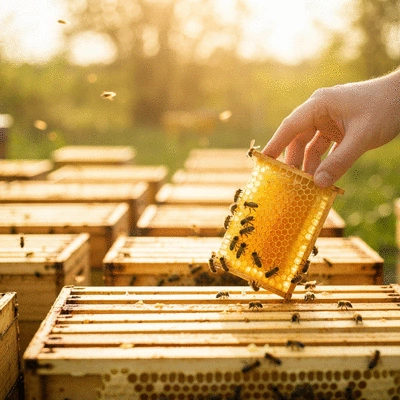
Let's explore the core principles that define sustainable honey and the ethical practices that ensure our bees stay healthy and productive. It's all about creating a balance that benefits both the bees and the environment, fostering a thriving community dedicated to conservation.
What Makes Honey Sustainable and Ethical?
When we talk about sustainable honey, we're referring to practices that prioritize the health of bee populations and their habitats. This means using methods that do not harm the environment or the bees themselves, such as avoiding pesticides and promoting biodiversity in floral sources. Here are some key aspects to consider:
- Organic Practices: Utilizing natural methods for pest control and disease management.
- Bee Welfare: Ensuring bees are healthy, well-fed, and free from stress.
- Local Sourcing: Supporting regional floral sources that enhance biodiversity.
These practices not only contribute to a healthier apiary but also lead to more flavorful and nutrient-rich honey. A win-win for everyone!
Defining Sustainability in Beekeeping Practices
Sustainability in beekeeping is about more than just honey production. It involves a holistic approach that incorporates environmental stewardship, animal welfare, and community engagement. For instance, beekeepers who practice sustainable methods focus on:
- Maintaining healthy hive populations
- Encouraging wildflower growth to support pollinators
- Practicing responsible harvesting methods that minimize impact
By adopting these principles, we can ensure that beekeeping remains viable for generations to come. Supporting sustainable beekeeping practices is essential for the health of our ecosystems and our food systems!
The Importance of Ethical Beekeeping for Bee Health
Ethical beekeeping goes hand in hand with sustainability. It embodies practices that prioritize the welfare of bees and their natural behaviors. Ethical beekeepers often:
- Limit hive stress through proper management techniques
- Avoid over-harvesting honey, allowing bees to store ample food for winter
- Regularly monitor hive health to prevent disease outbreaks
This commitment to ethical practices not only aids in bee health but also builds trust within the community. When you support ethical beekeepers, you’re playing a part in a larger movement dedicated to preserving our precious pollinators!
Why Support Ethical Beekeepers?
You might wonder, "Why should I support ethical beekeepers?" The answer lies in the profound impact bees have on our ecosystem and food supply. As an environmental advocate, I’ve seen firsthand how supporting these local heroes can ripple out to benefit all of us!
By choosing to purchase honey from ethical sources, we are not just enjoying a sweet treat; we are investing in the health of our planet and the sustenance of local communities.
The Role of Bees in Our Ecosystem and Food Supply
Bees are crucial pollinators, responsible for the growth of many crops we depend on. In fact, they contribute to:
- Pollinating over 75% of the world's flowering plants
- Supporting the production of fruits, vegetables, and nuts
- Enhancing biodiversity, which helps maintain ecosystem balance
Each bee plays a vital role in this process, and by supporting ethical beekeepers, we help protect these essential players in our food chain!
Community Benefits of Supporting Local Beekeepers
When we choose to support local beekeepers, we strengthen our community ties. This support leads to:
- Boosting the local economy through the purchase of locally-made honey
- Encouraging sustainable practices that benefit our environment
- Creating opportunities for education about beekeeping and environmental stewardship
Every jar of honey purchased from an ethical source is a step toward a more sustainable future for our planet. Together, we can cultivate a community that values bees and understands their importance!
Understanding the Impact of Australian Native Bees on Biodiversity
Australia is home to a unique array of native bee species, each contributing to our rich biodiversity. These bees play a different yet equally important role in pollination. By supporting beekeepers who protect these native species, we can help:
- Preserve native flora that relies on specific pollinators
- Enhance the resilience of our ecosystems in the face of environmental changes
- Foster a deeper understanding of our local environments
Promoting and celebrating our native bees is just one more way we can work together to protect our planet. Let's keep the buzz alive and support those who are making a difference!
We Want to Hear From You!
As we learn about sustainable honey and ethical beekeeping, it's essential to engage with the community. What practices do you currently follow to support sustainability in your own life? Share your thoughts below:
Taking Action: Supporting Ethical Beekeepers Beyond Purchases
As an avid apiarist, I believe our responsibilities extend beyond simply purchasing honey; we can actively support ethical beekeepers and promote sustainable practices within our communities. There are many ways to get involved, from volunteering to participating in educational initiatives. By engaging in these activities, we not only learn more about the fascinating world of bees but also contribute to their protection.
Here are some impactful ways we can support the ethical beekeeping community:
- Join local beekeeping clubs or associations
- Participate in community workshops and educational events
- Volunteer for bee conservation projects
Volunteering and Getting Involved in Beekeeping Education
Volunteering is a wonderful way to immerse yourself in the beekeeping community while making a tangible impact. There are countless opportunities for community involvement, whether through hands-on experiences or educational outreach. Many local beekeepers and organizations offer programs where you can learn about sustainable practices while helping out.
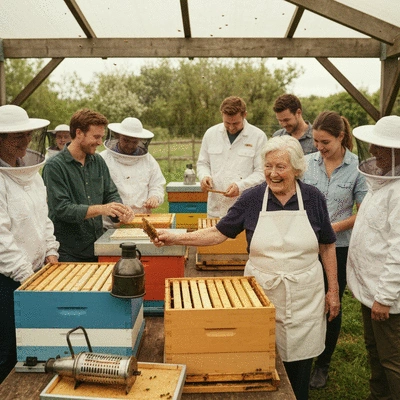
Consider these opportunities:
- Volunteering at local apiaries to gain hands-on experience
- Attending beekeeping workshops to sharpen your skills
- Participating in school programs designed to educate children about the importance of bees
Beekeeping Associations and How to Join
Joining a beekeeping association can provide a wealth of resources and connections. Associations often host events, workshops, and meetings that foster community learning and collaboration. By becoming a member, you gain access to expert advice and can stay up-to-date on best practices in sustainable beekeeping.
Looking for local associations? Check out:
- The Australian Honey Bee Industry Council
- Your state’s beekeeping association
- Regional bee clubs
Exploring Beekeeping Workshops for Hands-On Experience
Hands-on workshops can be a great way to dive deep into beekeeping. Many local beekeepers and organizations host these workshops, allowing you to learn directly from experienced beekeepers. This experience not only enhances your knowledge but also helps build your confidence in handling bees and maintaining hives.
Some workshop topics include:
- Bee biology and behavior
- Hive management techniques
- Honey extraction and processing
Advocacy for Bee Conservation and Sustainable Practices
Advocacy plays a crucial role in supporting ethical beekeepers. By promoting awareness of bee conservation, we can help create a favorable environment for these vital pollinators. As a community, we can collectively push for policies that protect bee habitats and promote sustainable agricultural practices.
Here are ways you can advocate for local beekeepers:
- Support legislation that benefits pollinators
- Write to local representatives about the importance of bees
- Join conservation events focused on bee protection
How to Advocate for Local Beekeepers and Their Practices
Advocating for local beekeepers means not only supporting their businesses but also sharing their stories. Highlighting their sustainable practices and the benefits they bring to our environment can encourage others to follow suit. At Nectar Network, I often share inspiring stories of local beekeepers on our platform, showcasing their commitment to ethical and sustainable beekeeping.
Staying Informed: Resources for Bee Conservation Efforts and Pollinator Protection
Staying informed is vital for effective advocacy. There are numerous resources available that provide information about bee conservation efforts and sustainable practices. Regularly engaging with these resources can help you stay updated on the latest research and initiatives in the beekeeping community.
Consider these valuable resources:
- The Center for Pollinator Research at Penn State University
- Bee informed Partnership's educational materials
- Your local agricultural extension office
Connecting with the Ethical Beekeeping Community
Building connections within the ethical beekeeping community can significantly amplify our impact. Networking with local beekeepers not only enriches our understanding of sustainable practices but also fosters collaboration and support for one another’s initiatives. By nurturing these relationships, we can create a robust network of passionate individuals dedicated to bee conservation.
Networking with Local Beekeepers and Producers
Getting to know local beekeepers and honey producers can open doors to a wealth of knowledge and resources. Attend local events or join community groups to meet fellow enthusiasts who share your passion for bees. These connections can lead to collaborative projects and shared learning experiences that benefit everyone involved.
Some tips for networking:
- Attend local beekeeping workshops and meet-ups
- Join social media groups dedicated to beekeeping
- Participate in community events centered around bee conservation
Online Communities and Forums Focused on Sustainable Beekeeping
In our digital age, online communities provide an excellent platform for connecting with other beekeepers. Many forums and social media groups are dedicated to sustainable beekeeping practices, where members can ask questions, share insights, and collaborate on projects. Engaging in these discussions can deepen your understanding and connect you with like-minded individuals.
Building Relationships with Local Honey Producers and Honey Co-ops
Building strong relationships with local honey producers not only supports their businesses but also encourages sustainable practices in our area. By purchasing honey directly from these producers, you can ensure that your choices align with your values, and you’ll often gain insights into their beekeeping practices as well.
Encouraging Sustainable Practices in Your Local Area
Your choices hold power! By actively encouraging sustainable practices in your local area, you can inspire others to follow suit. This collective effort can lead to a significant positive impact on bee populations and the health of our ecosystems. Together, we can advocate for changes that promote bee-friendly environments.
How Your Choices Can Influence Local Beekeeping Practices
Every decision we make about where to buy honey or how we support local beekeepers can help shape the industry. By prioritizing local, ethical honey products, we send a clear message about the importance of sustainability in beekeeping. Supporting these practices not only benefits the bees but also reinforces the value of community-driven initiatives.
Creating Awareness and Educating Others on the Importance of Bees and Bee-Friendly Practices
Education is a powerful tool in promoting bee conservation. Share your knowledge and passion for bees with friends, family, and your community. Whether it’s through social media, community events, or informal conversations, raising awareness can have a ripple effect that encourages more people to take action for our buzzing friends! For more information on how to create a bee-friendly environment, consider exploring native plants for backyard bees.
Frequently Asked Questions About Sustainable Honey and Ethical Beekeeping
Q: What is sustainable honey?
A: Sustainable honey refers to honey produced using practices that prioritize the health of bee populations and their natural habitats. This includes avoiding harmful pesticides, promoting biodiversity in floral sources, and ensuring bee welfare.
Q: What are the core principles of ethical beekeeping?
A: Ethical beekeeping focuses on the welfare and natural behaviors of bees. Key principles include limiting hive stress, avoiding over-harvesting honey to ensure bees have enough food, and regularly monitoring hive health to prevent disease outbreaks.
Q: Why is supporting ethical beekeepers important?
A: Supporting ethical beekeepers is crucial because bees are vital pollinators for over 75% of the world's flowering plants and are essential for our food supply. Your support helps protect these pollinators, boosts local economies, and promotes environmentally friendly practices.
Q: How do Australian native bees contribute to biodiversity?
A: Australian native bees play a unique and equally important role in pollinating native flora, enhancing the resilience of ecosystems, and fostering a deeper understanding of local environments. Protecting them helps preserve biodiversity.
Q: How can I get involved in supporting ethical beekeeping beyond purchasing honey?
A: You can join local beekeeping clubs, participate in community workshops, volunteer for bee conservation projects, advocate for policies that protect pollinators, and educate others about the importance of bees and sustainable practices. You can also join your local beekeeping community to connect with other enthusiasts.
Recap of Key Points
Here is a quick recap of the important points discussed in the article:
- Emphasize organic practices in beekeeping to promote bee health and biodiversity.
- Adopt sustainable harvesting methods to ensure hive longevity and prevent stress on bee populations.
- Support local beekeepers to strengthen community ties and contribute to the local economy.
- Engage in educational initiatives and workshops to learn more about ethical beekeeping.
- Advocate for policies that protect bee habitats and promote sustainable agricultural practices.
